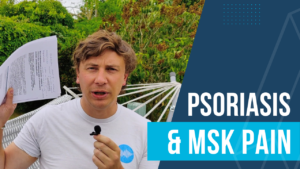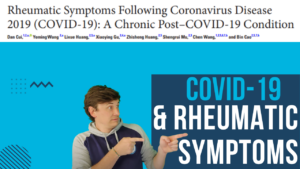I have been pushing the fact that delay to diagnosis in Axial Spondyloarthritis (AxSpA) is a big problem. NASS are way ahead of me and have started a campaign to bring that delay to diagnosis down from 8.5 years to 1 year… (On a personal level I think I might get done out of a job here but that’s not the point…)
This is a huge ambition and EVERYONE needs to help.
Here is the full information – https://nass.co.uk/get-involved/gold-standard/
You can fill out the consultation process here https://www.surveymonkey.co.uk/r/Gold-Standard-NASS-Consultation
For Therapists in all MSK settings we need to make sure we start being aware now and passing any knowledge on to our colleagues. NASS have identified 4 Delays to diagnosis which are:
Delay 1: People do not know that axial SpA may be a cause of their chronic back pain
Delay 2: General practitioners (GPs) may not recognise features of Axial SpA
Delay 3. People may be referred to non-rheumatologists who may not promptly recognise Axial SpA
Delay 4. Rheumatology and radiology teams may not optimally request or interpret investigations
For us as Therapists Delays 2&3 are where we can make a significant difference. Remember that GPs are often times not the first clinician to see this patient as they masquerade as an MSK condition so may attend a physio, osteopath or other MSK clinician first. Whether we are sat in GP surgeries directly as a First Contact Practitioner, private practice seeing a patient before medical screening or having received a referral we need to be at the top of our game to make sure we do the best for our patients. Below I have listed what we need to do to make sure we don’t contribute to any delays and just as importantly, help others around us be better too.
Delay 2: General practitioners (GPs) may not recognise features of Axial SpA
- Be aware of the signs, symptoms and risk factors for AxSpA
- Be aware of the associated co-morbidities for AxSpA
- Write detailed and referral letters with relevant clinical information and reasoning
- Share case studies with peers and colleagues
- Understand investigations required for AxSpA
- Encourage peers and colleagues to complete points 1-5
Delay 3. People may be referred to non-rheumatologists who may not promptly recognise Axial SpA
- Understand the referral pathways locally for suspected AxSpA conditions
- Be aware of referral criteria locally for suspected AxSpA conditions
- Ensure referral letters are clear and unequivocal that a Rheumatology Referral is warranted
- Educate patients and provide written documentation as required to ensure they corroborate referral request
- Encourage colleagues and peers to be aware of points 1-4
As mentioned above, I have been trying to push some of this information over the last few years so I have some information:
As a Recognising Rheumatology Booklet and Audiobook
Thank you for reading and please do fill out the questionnaire or get in contact to ask me any questions.


